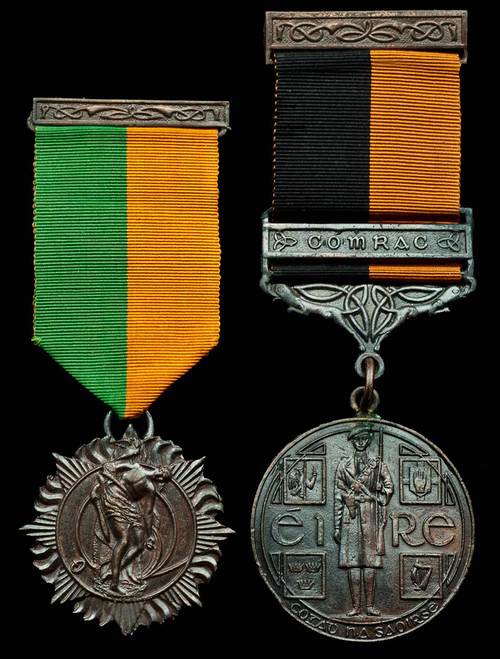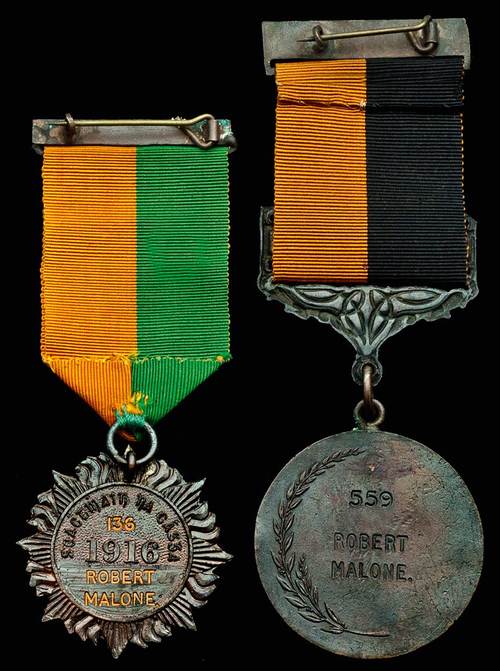Auction: 323 - The Numismatic Collector's Series Sale
Lot: 739
A 1916 Medal Pair to Robert Malone, Dublin Brigade, Irish Volunteers, Who Served During the 1916 Easter Rising with the Boland's Mills Garrison; Subsequently Serving in the Greater Dublin Fire Brigade, He Was Killed in the Pearse Street Fire, October 1936, And Given a Public Funeral, With A Guard Of Honour Made Up of Men Who Had Served With Him at Boland's Mills
1916 Medal, reverse officially named '136 Robert Malone.', with integral top riband bar; General Service Medal 1917-21, combatant's version with Comrac Bar, reverse officially named '559 Robert Malone.', with integral top riband bar, 1916 Medal officially corrected, very fine, together with the recipient's named Easter Week 1916 Old Comrades' Association Membership card (2)
Robert Malone served during the 1916 Easter Rising with the 3rd Battalion, Dublin Brigade, Irish Volunteers, at Boland's Mills. After the founding of the Irish Free State he joined the Pembroke Fire Brigade, which was amalgamated with the Greater Dublin Fire Brigade in 1930.
The Pearse Street Tragedy
'On the night of Monday 5th October 1936 a fire started at the premises of Exide Batteries at 164 Pearse Street, Dublin. The fire was first observed at 10:50pm by a tenant on the upper floor, and he shouted to passers-by, who called the fire brigade. The brigade received the call at 10:54pm and turned out in less than two minutes. When the brigade arrived they were advised that there were people in the building, and four firemen, Potts, Malone, McArdle, and Nugent, immediately entered the building and brought a hose up the stairs to the top floor, whilst two other firemen, Crowe and Kavanagh, took a hose up to the first floor. At that stage it was believed that the fire was in a room at the rear of the first floor. Fireman Potts took the First Aid Hose from Fireman Kavanagh and went to the door of the top floor landing and played it on the flames that were coming out of the glass roof to his left, but the hose was totally inadequate and he abandoned it. Firemen Malone, McArdle, and Nugent were waiting for the water to be turned on in their hose. No water came from the hose at any time. Very shortly after this an explosion occurred, closely followed by a second explosion. After these, the fire developed rapidly with the whole part of the upper floors in both premises being covered in flames and part of the building collapsing. Of the four firemen on the top floor only Potts survived. Reinforcements were summoned as the fire increased in size and intensity, with the brigade facing the serious problem of a lack of water from the fire hydrants. The fire eventually burnt itself out at about 2:00am, at which point it was apparent that three firemen were missing. It was not until early the following morning that the building had cooled enough to allow other members of the brigade to start searching through the rubble. At 6:00am they found the first body, charred and injured beyond recognition. The second body was found an hour later, and the third at around 10:00am. The bodies were taken to Sir Patrick Dun's Hospital.
The relatives of the three dead firemen accepted the offer of a public funeral. On Thursday 8th October the bodies were removed from the hospital and borne on fire-engines to City Hall, to lie-in-state in The Rotunda, with the coffins draped with the Irish Tricolour. The following evening the remains were removed to the Church of St. Andrew in Westland Row. President de Valera was amongst the huge congregation, and an estimated 50,000 people lined the route to Glasnevin Cemetery, Dublin, including a huge contingent of firemen from brigades all over Ireland and Britain. Malone was buried with full military honours, with the Last Post being sounded and a volley of shots fired over the grave by a guard of honour of 20 men who had served with him at Boland's Mills.
Estimate
$6,000 to $8,000







